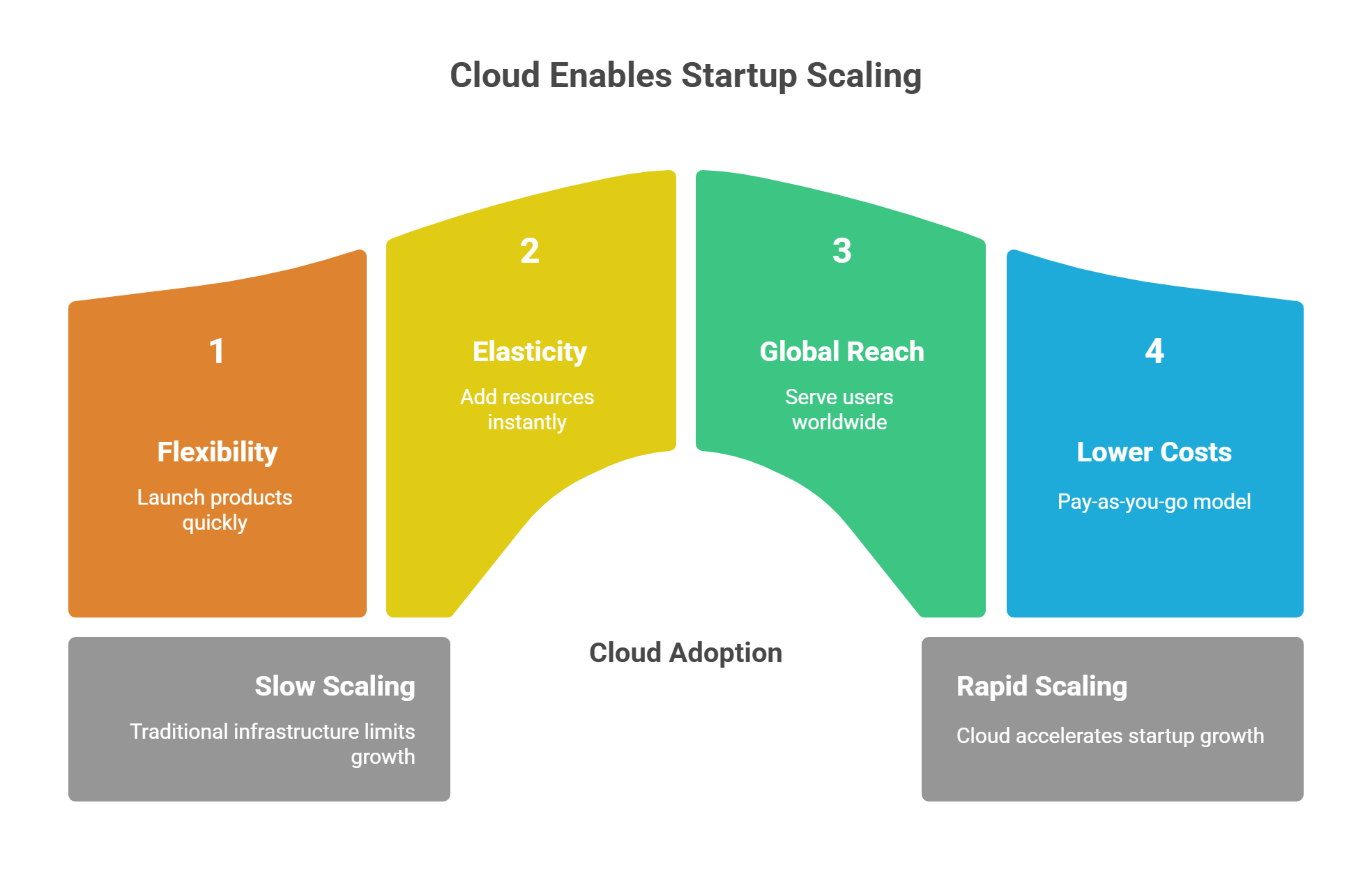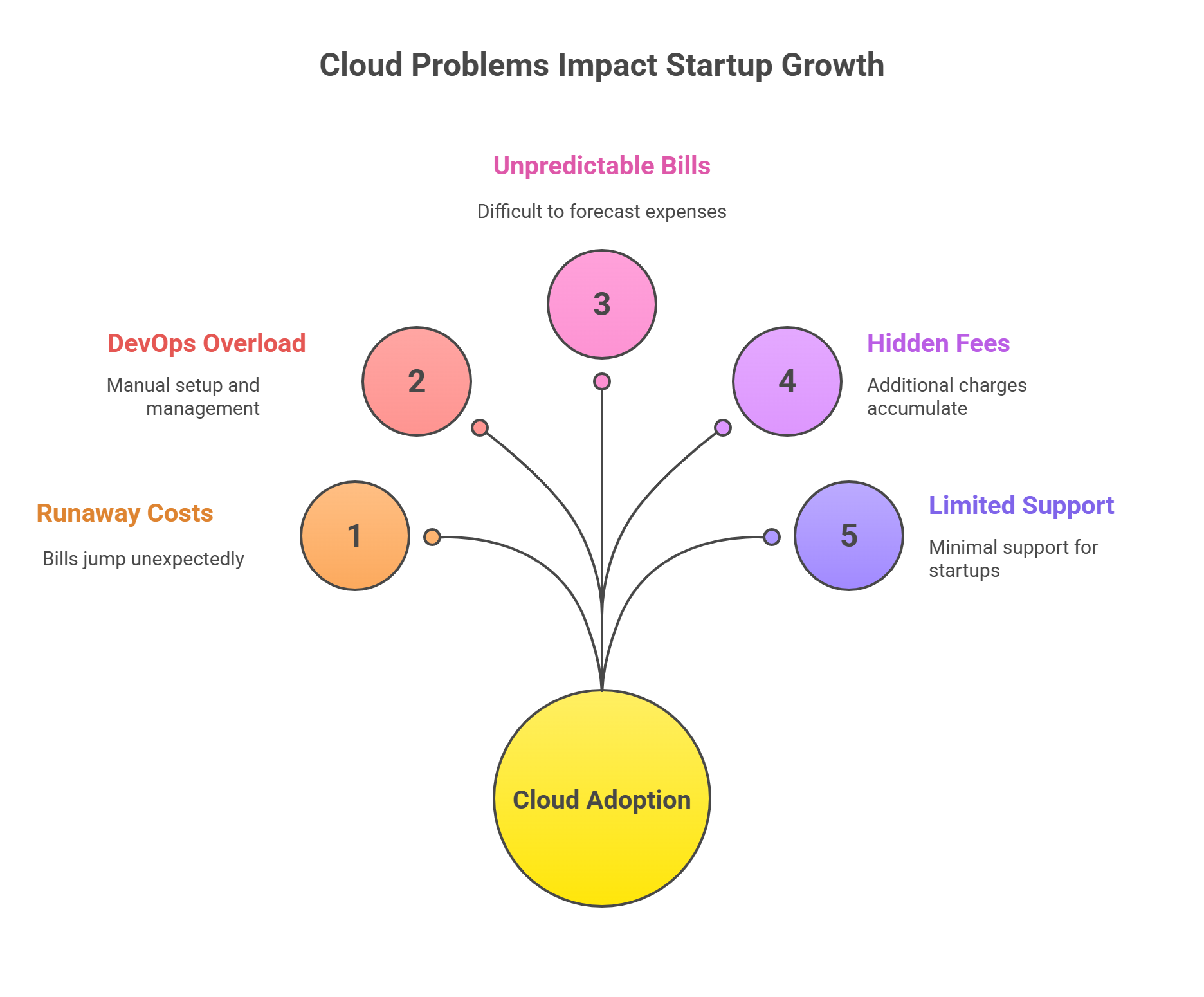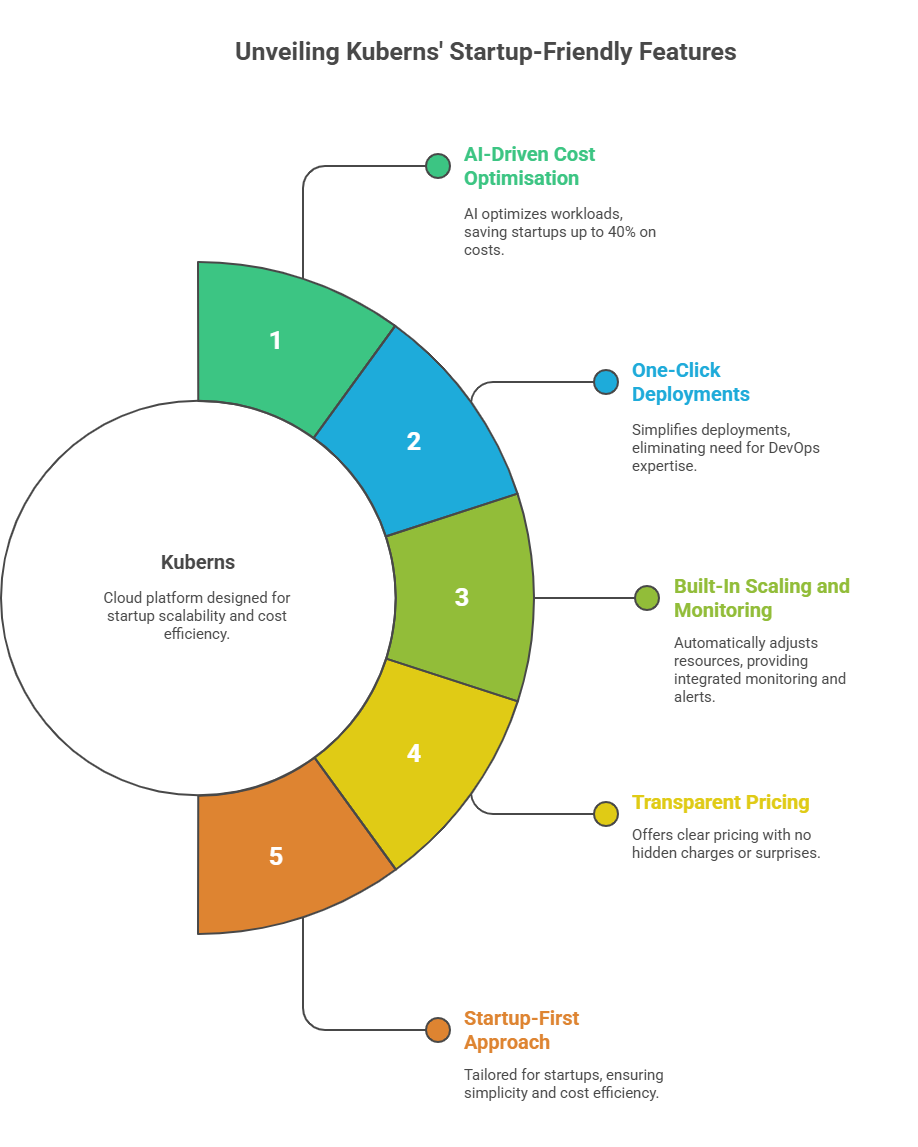Published
- 14 min read
Cloud for Startups: Which Platform Scales Without Burning Your Budget?

Introduction
The role of cloud for startups has never been more critical. Whether you’re an early-stage founder testing your MVP or a fast-growing SaaS team onboarding thousands of new users, cloud infrastructure is what makes scaling possible.
It gives startups the ability to launch quickly, reach global users, and compete with larger players, all without buying servers or building heavy IT teams.
But here’s the catch: while cloud promises flexibility, many startups end up burning through free credits and facing unpredictable bills just when growth kicks in.
What feels affordable in the beginning often turns into runaway costs, forcing founders to spend more time firefighting infrastructure than building their product.
In this guide, we’ll dig into the challenges startups face with cloud adoption, why costs spiral out of control, and how choosing the right platform can make the difference between scaling smoothly or stalling under pressure.
We’ll also explore how newer cloud-based solutions are changing the game, giving founders the power to scale without draining their budget.
Why Startups Can’t Ignore Cloud for Scaling?
 For a startup, the ability to scale quickly often makes the difference between winning the market and fading out.
For a startup, the ability to scale quickly often makes the difference between winning the market and fading out.
Traditional infrastructure, buying servers, hiring IT teams, and setting up data centres, is not just expensive. It’s painfully slow.
That’s why most founders today turn to the cloud for startups as the default foundation for growth.
Here’s why the cloud is so critical:
- Flexibility to launch fast: Startups can move from idea to live product in days, not months. No need to wait for hardware procurement or complex setup.
- Elastic scaling: If traffic surges overnight, the cloud allows businesses to add resources instantly. This is vital for early-stage products that may grow unpredictably.
- Global reach from day one: With cloud servers distributed across regions, even small teams can serve users worldwide without latency issues.
- Lower upfront costs: Instead of spending heavily upfront, startups can operate on a pay-as-you-go model, freeing resources for marketing and product development.
In fact, many startups rely on cloud-based solutions companies to accelerate this journey, because scaling efficiently is not just about adding servers. It’s about building systems that can grow without technical bottlenecks.
We’ve explained this in detail in our blog on how cloud-based solutions companies help businesses scale faster
The Harsh Reality: Problems Startups Face With Cloud
 While the cloud for startups is marketed as the ultimate growth engine, many founders quickly find themselves in a trap.
While the cloud for startups is marketed as the ultimate growth engine, many founders quickly find themselves in a trap.
The promise of fast launches and flexible scaling often turns into rising bills, technical bottlenecks, and sleepless nights.
Here are the most common problems startups face when relying on traditional cloud providers.
Runaway Costs After Credits Expire
Startup programs like AWS Activate, Google Cloud for Startups, or Azure for Startups attract founders with free credits.
At first, this feels like a win. You can build and test your product with zero infrastructure cost. But once those credits expire, the reality sets in. Bills jump from a few hundred dollars to thousands per month, leaving founders scrambling to explain ballooning costs to investors.
Worse, most teams don’t have proper cost monitoring in place.
A CloudZero report found nearly 70% of businesses overspend on cloud due to poor visibility into where money is going.
For a lean startup, that overspend can mean the difference between hiring an engineer or shutting down a marketing campaign.
DevOps Overload for Small Teams
Scaling isn’t just about servers. Startups also need CI/CD pipelines, container orchestration, monitoring dashboards, logging systems, and security policies. On traditional cloud platforms, all of this has to be set up and managed manually.
That means either hiring expensive DevOps talent early or asking developers and even founders to handle it themselves.
Instead of focusing on shipping product features, founders end up debugging Kubernetes clusters or fighting downtime. For a company running on tight deadlines and investor pressure, this distraction is costly.
Unpredictable Growth, Unpredictable Bills
Startups rarely grow in a straight line. One launch announcement, a viral marketing campaign, or a successful fundraising round can suddenly bring in thousands of new users. Traditional cloud systems make it hard to plan for this kind of irregular scaling.
- If you over-provision resources, you waste money paying for idle servers.
- If you under-provision, your app crashes during peak demand, damaging your brand reputation.
This unpredictability makes it difficult for founders to forecast expenses, especially when budgets are already stretched thin.
Hidden Fees That Add Up
Beyond compute and storage, startups are often blindsided by additional charges. Common culprits include:
- Data transfer costs between regions or services.
- I/O requests on databases.
- Idle reserved instances that aren’t being used.
These hidden fees are rarely understood at the start, but pile up quickly. What looks like a $500 monthly setup can quietly creep into $2,000 or more once traffic scales.
Limited Support and Complexity
Many cloud providers focus on enterprise clients, which means startups often struggle with minimal support. Instead of getting quick help, founders are directed to documentation or community forums. When your app is down in the middle of a product demo, “read the docs” is not the answer you want.
On top of that, the dashboards and tools offered by traditional providers are overwhelming. Managing dozens of services, each with its own pricing model, creates a complexity nightmare for small teams.
These realities don’t mean startups should avoid the cloud. They highlight the need for smarter platforms.
As we explained in our post on cloud computing for small businesses, the right cloud partner should make growth simpler, not harder.
Unfortunately, most traditional providers weren’t designed with lean, fast-moving startups in mind.
Why Kuberns Let’s Startups Scale Without Burning Their Budget?
 Most cloud for startups stories sound the same: rapid growth in the beginning, then spiralling costs and sleepless nights trying to manage infrastructure.
Most cloud for startups stories sound the same: rapid growth in the beginning, then spiralling costs and sleepless nights trying to manage infrastructure.
Kuberns was built to solve exactly these challenges, giving founders the freedom to scale without financial surprises or DevOps headaches.
AI-Driven Cost Optimisation
Instead of relying on manual cost monitoring, Kuberns uses AI to optimise workloads automatically. This means startups can save up to 40% on AWS infrastructure costs without lifting a finger.
For bootstrapped founders, that saving can fund customer acquisition, product improvements, or hiring, instead of disappearing into inflated cloud bills.
One-Click Deployments Without DevOps
Traditional cloud providers require specialised DevOps talent to set up CI/CD pipelines, configure scaling rules, and manage logs. Kuberns removes that barrier with one-click deployments.
Push your code from Git, and the platform handles containers, scaling, monitoring, and even SSL certificates. So your team can focus entirely on building the product.
Built-In Scaling and Monitoring
With Kuberns, startups don’t need to buy extra tools for performance monitoring or hire engineers to fine-tune scaling policies.
The platform automatically adjusts resources to match demand, whether you’re onboarding your first 100 users or serving thousands after a viral launch. Integrated monitoring and alerts mean you’re always in control, without extra overhead.
Transparent Pricing With Zero Platform Fees
Unlike traditional providers that bury costs in complex billing dashboards, Kuberns offers transparent pricing. There are no hidden charges for data transfers or “surprise” usage spikes.
For startups that need to keep investors updated and budgets tight, this clarity removes a huge layer of stress.
Startup-First Approach
Kuberns isn’t just another cloud provider. It was designed for small businesses and startups that need to move fast with lean teams. As we covered in our blog on cloud-based servers for small businesses, smaller teams need simplicity and cost efficiency more than anything else, and Kuberns delivers both.
By removing the complexity of DevOps, cutting hidden costs, and automating scaling, Kuberns gives startups what they’ve always needed from the cloud: speed, savings, and peace of mind.
Real Startup Scenarios: Scaling Smart, Not Expensive
Every startup faces the same tough balancing act. Grow fast, but don’t run out of money doing it.
The wrong cloud setup often tips the balance in the wrong direction.
Let’s look at a few scenarios that highlight the difference between traditional cloud and Kuberns.
Bootstrapped Startup After Free Credits Run Out
Before: A small SaaS team launches with AWS Activate credits. Everything feels free at first, until the credits expire. Suddenly, their monthly bill jumps to over $2,000. The founders, already stretched thin, have no visibility into why the costs are spiking. After with Kuberns: Instead of scrambling, the same setup on Kuberns saves up to 40% on AWS infrastructure automatically. The founders can reinvest savings into customer acquisition rather than firefighting billing dashboards.
SaaS Product Going Viral Overnight
Before: A SaaS app gets featured on Product Hunt and traffic surges 10x overnight. Their manually configured scaling rules fail, causing downtime right when they needed visibility most. Users churn before even trying the product.
After with Kuberns: With built-in auto-scaling, the platform automatically spins up resources in real time. Monitoring ensures zero downtime, so the team can ride the viral wave instead of losing it. By collaborating with an SEO agency specialising in link building, SaaS brands can further amplify their reach, ensuring that every spike in visibility, whether from a Product Hunt launch or high-authority backlinks, translates into sustained growth.
Digital Agency Juggling Multiple Clients
Before: An agency managing 12 client projects spends hours switching between different cloud dashboards. Each client’s project requires separate DevOps setups, adding both complexity and cost.
After with Kuberns: The agency uses one-click deployments for all clients on a single platform. Integrated monitoring and transparent pricing mean less overhead, faster delivery, and better margins on each project.
These examples show what founders already know: the cloud can make or break a startup.
With Kuberns, the outcome tilts toward faster growth and leaner spending, instead of stress and runaway costs.
Key Takeaways for Startup Founders
For founders, choosing the right cloud for startups isn’t just a technical decision. It’s a financial and strategic one.
The wrong platform can drain budgets and slow growth, while the right one can free up resources and keep the team focused on product and customers.
Here are the key lessons startups should keep in mind:
- Free credits aren’t a long-term plan. Startup cloud programs are helpful for early testing, but they mask the true cost of scaling. Plan ahead for what happens after the credits expire.
- Cloud shouldn’t create DevOps overhead. Founders and developers should be building features, not fixing infrastructure. If the platform requires constant manual work, it’s slowing you down.
- Cost transparency is non-negotiable. Scaling should be predictable. Surprise bills from hidden fees or poor visibility can derail both budgets and investor confidence.
- Startup-first platforms give you leverage. As we discussed in our guide on cloud computing for small businesses, lean teams need tools that simplify scaling, not complicate it.
The bottom line? Founders should prioritise simplicity, automation, and cost optimisation when choosing a cloud platform.
That’s how you scale smarter, without burning your budget.
Choose Smarter Cloud, Not Just Cheaper Cloud
For startups, the cloud is not optional. It’s the backbone of how products are built, launched, and scaled in 2025. But too often, founders discover that what starts as a flexible, affordable solution quickly becomes a source of runaway costs and endless infrastructure headaches. Free credits vanish, hidden fees appear, and scaling feels like a gamble.
The answer isn’t just finding the cheapest cloud. It’s choosing a smarter cloud for startups. A platform that gives you the freedom to scale on demand, the visibility to control costs, and the simplicity to build without DevOps overhead.
That’s exactly what Kuberns delivers.
With AI-powered cost optimisation (up to 40% AWS savings), one-click deployments, and transparent pricing with zero platform fees, Kuberns is designed for founders who want to grow without burning through their budget.
If your startup is ready to scale smarter, not harder, it’s time to explore a cloud partner that actually works in your favour.
👉 Start with Kuberns today and scale your product without the scaling pains.

FAQs on Cloud for Startups
1. Why is the cloud important for startups?
Cloud for startups enables rapid product launches, flexible scaling, and global reach without heavy upfront infrastructure costs. Instead of buying servers and hiring large IT teams, founders can focus on building and growing their product.
2. What is the biggest cloud challenge startups face?
The biggest challenge is runaway costs. Free credits from AWS, GCP, or Azure help in the early stage, but once they expire, bills often skyrocket. Hidden charges like data transfers and storage also add up quickly, leaving many founders unprepared.
3. Which cloud is best for startups with small teams?
Startups with lean teams need simplicity and cost efficiency. While providers like AWS and Google Cloud offer credits, they require DevOps expertise. Platforms like Kuberns simplify everything with one-click deployments, built-in scaling, and up to 40% AWS savings, making them ideal for small teams.
4. Are free cloud credits enough for a startup to scale?
Credits are useful for testing and initial launches, but they are temporary. Once they expire, the real costs appear, and many startups find them unsustainable. That’s why it’s important to plan for long-term scalability with platforms that prioritise transparency and cost optimisation.
5. How can startups avoid overspending on cloud?
Startups should monitor usage closely, automate scaling to prevent over-provisioning, and choose platforms with transparent pricing. As highlighted in our blog on cloud computing for small businesses, clarity in costs and automation are the keys to staying lean.